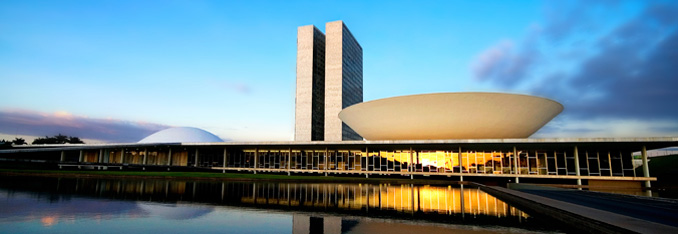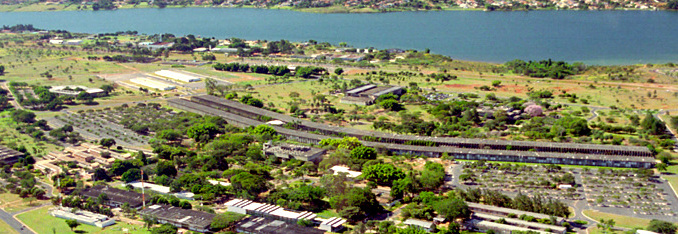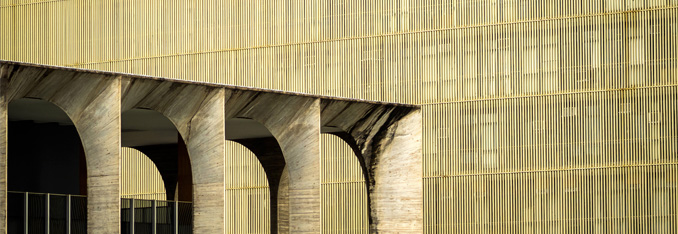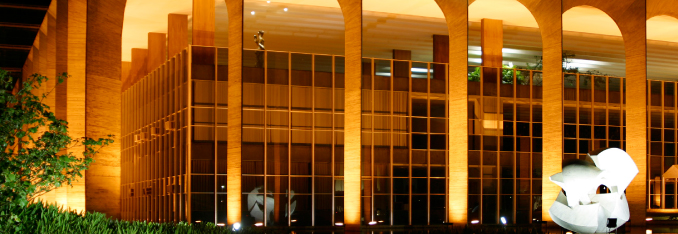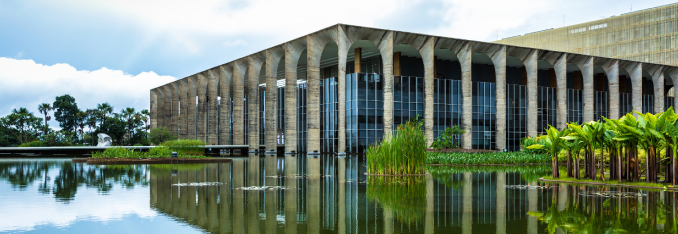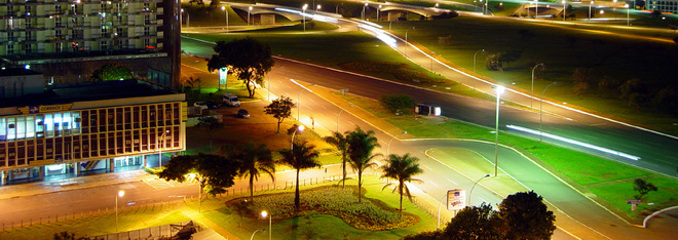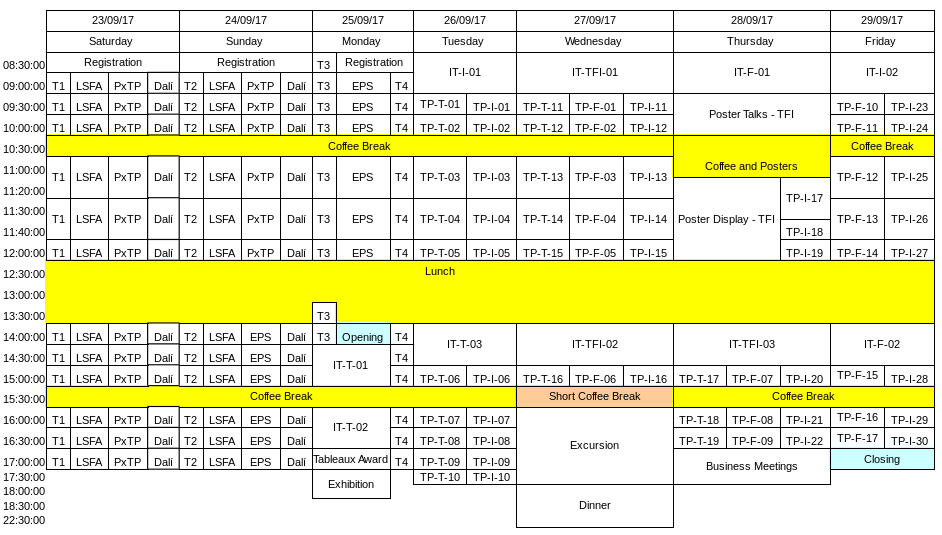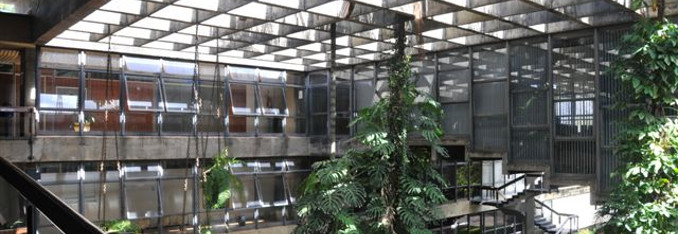Local Information:
(This is under construction. Please return for more information.)
Accessibility
Brasília is served by an international airport which handles around
19 million passengers a year. As part of the preparation for hosting
the 2014 FIFA World Cup, the airport received massive investments,
from both the public and private sectors, for the renovation of the
passenger’s terminals and the enlargement of the taxiways, which
has allowed to almost double the number of positions available for
aircrafts and, thus, increase the number of available routes for
both domestic and international flights. International flights
directly connect Brasília with Santiago (Chile),
Panama City (Panama), Miami (USA), Atlanta (USA),
and Lisbon (Portugal).
It is also worthy mentioning that Brasília hosts one of the most
important regional hubs in Brazil. There are direct flights from all
the state capitals, including Rio de Janeiro, São Paulo, Porto
Alegre, Natal, Recife, among other places which are easily
accessible directly from other continents and from other countries
in the Americas.
Brasília is centrally located and well served by coaches from elsewhere in Brazil, but prices for internal flights are competitive and travel times much shorter.
Transportation
The airport is just 20 minutes away from the centre, where the
hotels are. Taxis cost around € 15.00 and are a convenient way to
go from and to the airport.
There is also an Executive Bus from the airport to the Hotels
Sectors. It runs every half an hour and stops by the door of or
conveniently close to the main hotels in these areas. The trip costs
R$ 12.00 (around € 2.50).
Regular buses (lines 102, 102.1) also run from the airport to the
main bus terminal in town, are frequent and quite cheap (€ 0.50).
From the bus terminal you will need to catch another bus or a taxi
to get to other places. If you do not speak Portuguese or do not
know your way around, this is not recommended for you.
Visa Requirements
Brazil’s foreign policy is based on reciprocity. The Brazilian
immigration authority will not require application for a visa prior
to travelling/entering the country if your own country does not
require such from Brazilian nationals. Nationals of 86 countries can
enter Brazil without a visa, including all EU countries. For those
who need a visa, there is a special category for attendees of
scientific meetings (VITUR), where a letter of invitation is needed. You
should check with the Brazilian Consulate in your country what the
requirements are. The organisation of the event will provide the
required letters upon registration, in case you need them to apply
for visas.
Accommodation
Brasília has a vast number of hotels. They are located in the
central area, closer to the cross between the Monumental and the
Residential Axes, about 10 minutes by car to the events venue.
We have negotiated special rates at the Comfort Suítes Brasília:
Single: R$ 237,00
Double: R$ 280,00
Values are per night, breakfast is included, and taxes are not included (15%). In order to benefit from these rates, you need to contact the hotel directly via email (reservas.csb@atlanticahotels.com.br or eventos.csb@atlanticahotels.com.br) and cite the conferences.
Alternatives can be found at the usual search sites: Booking.com, airbnb, Trip Advisor, etc.
Shuttle Hotels/FINATEC/Social Events
The organisation will provide transportation from the North Hotels Sector (SHN, stop in front of the Comfort Suítes Brasíllia) to the FINATEC Building at the University of Brasília (UnB). The trips between UnB (ICC Norte) and UnB (Finatec) are for registered attendees of the tutorial "PVS for Computer Scientists". We will also provide transportation from the Finatec Building to the Itamaraty Palace, and from there to the APCEF (where the dinner will be held).
- 23/09/17
- 07:40:00 SHN ↦ UnB (Finatec)
- 08:15:00 SHN ↦ UnB (Finatec)
- 17:45:00 UnB (Finatec) ↦ SHN
- 18:00:00 UnB (Finatec) ↦ SHN
- 24/09/17
- 07:50:00 SHN ↦ UnB (Finatec)
- 08:15:00 SHN ↦ UnB (Finatec)
- 17:00:00 UnB (Finatec) ↦ SHN
- 17:30:00 UnB (Finatec) ↦ SHN
- 25/09/17
- 07:40:00 SHN ↦ UnB (Finatec)
- 08:10:00 UnB (Finatec) ↦UnB (ICC Norte)
- 11:30:00 SHN ↦ UnB (Finatec)
- 12:30:00 UnB (ICC Norte) ↦ UnB (Finatec)
- 13:50:00 UnB (Finatec) ↦UnB (ICC Norte)
- 17:30:00 UnB (ICC Norte) ↦ UnB (Finatec)
- 18:00:00 UnB (Finatec) ↦ SHN
- 18:30:00 UnB (Finatec) ↦ SHN
- 26/09/17
- 07:30:00 SHN ↦ UnB (Finatec)
- 08:00:00 SHN ↦ UnB (Finatec)
- 18:00:00 UnB (Finatec) ↦ SHN
- 18:30:00 UnB (Finatec) ↦ SHN
- 27/09/17
- 07:00:00 SHN ↦ UnB (Finatec)
- 07:30:00 SHN ↦ UnB (Finatec)
- 08:00:00 SHN ↦ UnB (Finatec)
- 15:40:00 UnB (Finatec) ↦Itamaraty
- 16:10:00 UnB (Finatec) ↦ SHN
- 16:40:00 UnB (Finatec) ↦ Itamaraty
- 17:00:00 Itamaraty ↦ APCEF
- 18:00:00 Itamaraty ↦ APCEF
- 21:00:00 APCEF ↦ SHN
- 21:30:00 APCEF ↦ SHN
- 22:00:00 APCEF ↦ SHN
- 28/09/17
- 07:00:00 SHN ↦ UnB (Finatec)
- 07:30:00 SHN ↦ UnB (Finatec)
- 08:00:00 SHN ↦ UnB (Finatec)
- 17:20:00 UnB (Finatec) ↦ SHN
- 17:50:00 UnB (Finatec) ↦ SHN
- 18:30:00 UnB (Finatec) ↦ SHN
- 29/09/17
- 07:30:00 SHN ↦ UnB (Finatec)
- 08:00:00 SHN ↦ UnB (Finatec)
- 17:15:00 UnB (Finatec) ↦ SHN
- 17:40:00 UnB (Finatec) ↦ SHN
Vaccination
Brazil does not require an International Certificate of Vaccination or Prophylaxis for entry into the country.
Travelers are encouraged, however, to ensure their routine immunizations are up to date (as recommended by their country of origin), since it is an effective and safe measure for the prevention of various diseases.
Brasília is not in the endemic area of yellow fever. However, it is also important that travellers take yellow fever vaccination 10 days before visiting forested areas or participating in ecotourism or rural tourism activities. For further information on yellow fever, please click here.
(source: Brazilian Ministry of Health)
Out and Around
Brasília is a modern, lively place, with a variety of attractions
worth seeing. For those who like the urban environment and cultural
activities, almost all public buildings are open for visitation,
most of them with free guided tours. Besides the architectural
features, they hold interesting art collections which are also open
for visitation. For the more adventurous, we are in the middle of
the Cerrado
ecosystem, which makes trips to nearby parks and waterfalls a very
pleasant experience. Some of the suggested places to visit include
the National parks:
and nearby cities of historical interest:


